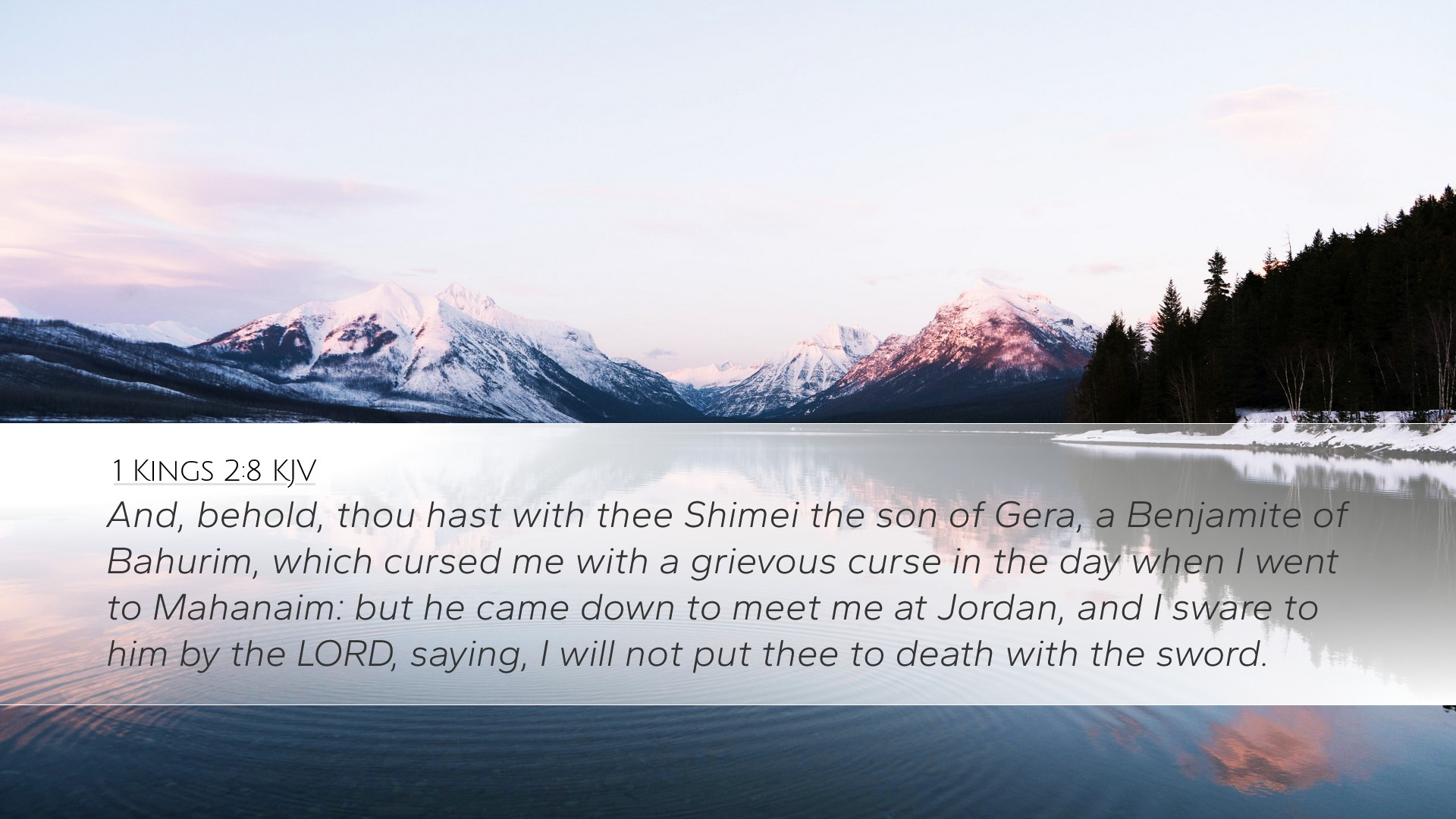Commentary on 1 Kings 2:8
Verse Context: 1 Kings 2:8 states, "And, behold, thou hast with thee Shimei the son of Gera, a Benjamite of Bahurim: which cursed me with a grievous curse in the day when I went to Mahanaim: but he came down to meet me at Jordan, and I swore to him by the LORD, saying, I will not put thee to death with the sword." This verse is part of David’s instructions to Solomon as he prepares his son to ascend the throne.
Historical Background
The context of this verse lies within David's final days and his charge to Solomon. Shimei, a relative of King Saul, had cursed David during Absalom’s rebellion. Despite his offense, David had spared Shimei's life when he returned to seek forgiveness. However, David’s acknowledgment of Shimei’s past actions is essential in David's instructions to Solomon.
Theological Implications
David’s mention of Shimei brings to light several theological themes, such as justice, mercy, and the complexities of leadership. Solomon’s handling of Shimei will set a precedent for his own leadership. David’s reminder serves as a caution and a lesson in discernment and the consequences of one's actions.
1. The Nature of Human Leadership
As noted by Matthew Henry, leadership often entails dealing with complex human relationships, particularly when offenses have occurred. The presence of Shimei symbolizes unresolved conflicts that leaders must navigate. Leaders may face challenges with those who have wronged them, reflecting the reality of human fallibility.
2. The Importance of Forgiveness
Albert Barnes points out that David’s previous forgiveness of Shimei is a powerful reminder of the grace that can exist in relationships. However, this grace does not eliminate accountability. David has chosen to spare Shimei but acknowledges the potential for future repercussions, highlighting the balance between mercy and justice.
3. Divine Providence in Justice
Adam Clarke emphasizes that the narrative illustrates God’s sovereign control over justice. While Shimei received mercy at the hands of David, he is not exempt from accountability. This underscores the biblical principle that while God is merciful, He also administers justice, often through earthly authorities like that of a king.
Principles of Leadership
David's final charge to Solomon offers timeless lessons for all in positions of authority. The careful consideration of past actions, coupled with an awareness of the implications of decisions, is crucial in governance.
- Accountability: As leaders, one must recognize the weight of their decisions regarding those who have wronged them.
- Forgiveness: Providing forgiveness is essential, but it should be coupled with wisdom in its application.
- Not overlooking past offenses: Just as David recognized Shimei's past actions, leaders must remain aware of the implications of previous offenses when making judgments.
- Leadership legacy: Solomon’s response to Shimei would define his reign, emphasizing the long-lasting impact of leadership decisions.
Conclusion
In summary, 1 Kings 2:8 serves as a poignant reminder of the complexities of leadership and the necessity of balancing mercy with justice. The nuanced dynamics between David, Solomon, and Shimei provide ample material for reflection on how leaders navigate personal relationships and past grievances. Ultimately, understanding such dynamics can lead to more profound insights on leading with grace, wisdom, and discernment.


